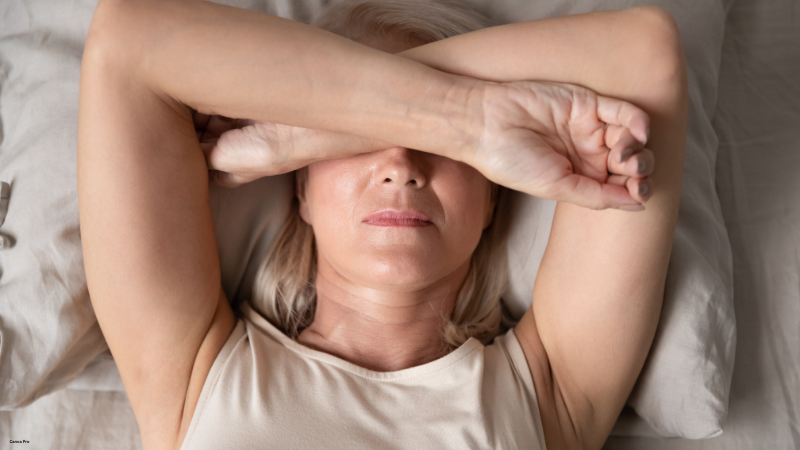Insomnia affects millions, disrupting lives and health. Discover how cognitive behavioral therapy and sleep restriction techniques can help reset your sleep patterns, leading to restful nights and improved well-being.
Some fortunate individuals drift off to sleep within moments of hitting the pillow. Others spend hours tossing and turning, watching the clock tick by, and searching for new ways to count sheep, night after night, for weeks, suffering from insomnia symptoms.
According to Dr. Sairam Parthasarathy, who heads the University of Arizona Health Sciences Center for Sleep, Circadian, and Neuroscience Research, insomnia plagues 10% to 15% of Americans and stems from a mix of biological and lifestyle factors. Women, night shift workers, and older adults face higher risks. It often has a genetic component, and recent studies show COVID-19 can trigger new cases.
The Impact of Chronic Insomnia
While occasional sleepless nights happen to everyone, usually due to stress or life changes, chronic insomnia occurs at least three nights weekly for over three months without a clear health-related cause. “For severe cases, it can be crippling,” Parthasarathy notes. “Some people find it debilitating, while others have dealt with it for years”—often seeking help when retirement or increased free time highlights the issue.
Addressing insomnia is crucial: The condition is linked to higher risks of high blood pressure, diabetes, obesity, depression, heart attacks, and strokes. It can also significantly impact the quality of life.
The good news is that most people can overcome insomnia by resetting their sleep schedule—and cognitive behavioral therapy for insomnia (CBT-I) is a proven insomnia treatment. However, it requires time and effort.

Retraining your brain for sleep
CBT-I works like “a brain retraining program,” explains Dr. Jing Wang, clinical director at the Mount Sinai Integrative Sleep Center and associate professor at the Icahn School of Medicine at Mount Sinai. Over four to eight weeks of weekly sessions, you’ll work with a sleep specialist or psychiatrist trained in behavioral sleep medicine to tackle the behaviors and habits fueling your insomnia.
Sleep Restriction Therapy: Reshaping Bedtime Habits
Sleep restriction therapy is a key part of treatment, which helps create new bedtime habits. Parthasarathy says that patients usually keep a sleep diary, noting when they go to bed, wake up, and how long they sleep. Doctors then use this information to make a temporary sleep schedule. For instance, if someone goes to bed at 8 p.m. and gets up at 6 a.m. but only sleeps for six hours, they spend the rest of the night worrying about not sleeping, snacking, or trying to be productive.
With sleep restriction for insomnia, Parthasarathy would work backward from the wake-up time (6 a.m.), which is often fixed due to work. He’d then tell the person to get into bed at midnight—aiming for them to fall asleep right away and get the same six hours before waking at 6 a.m. This sleep compression reduces time in bed awake. Other patients get different bedtimes based on their total sleep time and when they need to get up. (Doctors never set a schedule with less than 5.5 hours of sleep per night, though.)
Creating a Stronger Sleep Connection
No matter how tired someone feels before their set bedtime, they can’t go to bed earlier. “We’re trying to make the sleep time more solid, and cut out the time when sleep isn’t happening in bed,” he explains. “By making them stay up longer, their brain craves sleep more. So when they go to bed at 12, they’re not tossing and turning for an hour. They fall asleep in 5 or 10 minutes.”
This sleep compression therapy approach helps reset the body’s sleep patterns and creates a more vital link between being in bed and sleeping. Over time, as sleep improvement occurs, bedtime can be gradually moved earlier. The goal is to train the brain to associate bed with sleep, not lying awake or doing other activities.
Tracking Progress and Adjusting Sleep Efficiency
After a week, Parthasarathy checks his patients’ sleep efficiency. While sleep diaries aren’t perfect, he finds patients usually estimate their fall-asleep time and night awakenings well, especially if they check the clock. If someone’s sleep efficiency tops 90% nightly—meaning they slept over 90% of their time in bed—he extends their sleep window by 15 minutes, letting them go to bed a bit earlier. He keeps adjusting the window weekly in 15-minute steps until sleep efficiency drops to 85-90%. “Below 85% means too much bedtime awake, which we want to avoid,” he explains. Over time, patients’ schedules shift to their ideal bedtime—and their bodies learn that bed means sleep time. “Our brains get subtly programmed,” Parthasarathy notes.
Challenges and Considerations in Sleep Restriction Therapy
While CBT-i sleep restriction is generally safe and effective, sleep restriction therapy can be tough; Parthasarathy admits things often worsen before improving for insomnia patients. That’s why he advises against CBT-I sleep restriction for those with seizure disorders or bipolar disorder—sleep deprivation can trigger issues. It’s also not ideal for jobs needing high alertness, like bus drivers.
Even if you try sleep restriction therapy, stay safe in the hours before bedtime. “The sleep restriction therapy first week, people feel sleepier,” Parthasarathy says. “Some wonder, ‘Why am I doing this sleep deprivation therapy?'” Besides avoiding risky activities like driving, experts suggest filling pre-bed hours with calming tasks: writing, bathing, or meditating.
Setting Up for Success
Better sleep habits are crucial in CBT-I, Wang says. This includes new screen habits: Wang suggests turning off phones, computers, and TVs at least 1-2 hours before bed. She explains that screens are problematic partly due to their light: They reduce melatonin, the hormone that prepares you for sleep.
The content on your screens can be troublesome too. Wang notes that people often react strongly to specific shows. Some stay up late watching news or world events, but these scenes can upset them so much that they can’t sleep. Scary movies before bed can have a similar effect.
Besides keeping your bedroom dark, consider getting rid of your alarm clock. “Hide it or move it out,” Wang suggests. “Looking at the time wakes you up. You start thinking, ‘It’s midnight, I only have five hours left to sleep.'” This kind of worry doesn’t help you rest.
Wang also tells patients to use sleep trackers less or not at all. She’s seen people get too focused on the data, worrying about every slight change in their sleep. “Sleep varies night to night,” she explains. “If looking at the data makes someone anxious and more worked up, I tell them not to check it.”
Changing Daily Habits for Better Sleep
What you eat and drink before bed affects how well you sleep. Doctors usually say not to eat right before bed—late meals can make you wake up more at night. It’s also good to stop drinking caffeine by noon, says Dr. Emerson Wickwire, who leads sleep medicine at the University of Maryland Medical Center.
Be careful with alcohol too. “Alcohol makes sleep worse in every way,” Wickwire says, “except one—you’ll fall asleep faster.” But after that, things get worse. Alcohol relaxes muscles, including those in your throat, which can cause sleep apnea symptoms, even if you don’t have the condition. “Alcohol also changes how you move through sleep stages, which can hurt brain function,” he adds. You might wake up more often after drinking and find it hard to fall back asleep.
If you’re a nap lover, you must change your habits during CBT-I. Wickwire explains how long you’ve been awake and active affects your sleep drive. While naps are okay for most people, they can slow progress during CBT-I. They make you less tired at bedtime. For instance, if you wake up at 7 a.m., by 11 p.m., you’ve been awake for 16 hours—your body should be ready for sleep. “But if you nap at 6 p.m., by 11 p.m., you’ve only been up for four or five hours,” he says. This could lead to a night of restlessness.
When Medication Might Help
The American Academy of Sleep Medicine always suggests CBT-I as the first treatment for long-term insomnia. “Many studies have compared behavior treatments and medications results,” Wickwire notes. “Generally, CBT works just as well in the short term, with longer benefits.” Research shows CBT-I has fewer side effects than medication, less chance of relapse, and tends to keep improving sleep over time.
“No pill can teach your body how to sleep,” Wickwire says. “But that doesn’t mean all sleep medications are bad.” Patients should talk to their doctor; sometimes, especially in severe cases, it makes sense to use CBT-I along with prescribed sleep medication.
Over-the-counter sleep aids are different. It’s best not to rely on products like ZzzQuil, Benadryl, melatonin gummies, or Advil PM, Wang advises. “If you’re sick and need to take one, that’s okay.” But with melatonin especially, “There’s a lot of variation and potential for misuse or accidentally causing the opposite effect. We strongly discourage self-medicating for insomnia.”
Hope for Better Sleep
People with insomnia often start sleeping better within a couple of weeks. Wang says the exact time it takes varies; some might need six to 12 weeks before seeing a big difference. How long sleep restriction therapy takes to work depends on the individual and the severity of their sleep complaints.
Wang reminds her patients, who are often tired and stressed, that improvement is possible. “It’s usually a slow process. We don’t expect all issues to vanish overnight,” she explains. “It’s about small, consistent steps—and encouraging those who find it tough that yes, things might get worse before they improve, especially if sleep restriction therapy is not working at first due to fatigue and daytime sleepiness.” But she assures you that if you stick with the sleep restriction program, sleep restriction plan, sleep restriction method, or sleep restriction technique, nights of deep, uninterrupted sleep consolidation will become more than a wishful thought. The sleep foundation is to restrict your sleep and retrain your brain. With proper sleep education and sleep therapy, you can overcome insomnia and get the needed restful sleep.
Source:
Angela Haupt (August 16, 2024). The Best Way to Treat Insomnia. https://time.com/7011068/insomnia-best-treatment-sleep-schedule/. Accessed August 21, 2024
You may also like to read:
How to Eliminate Underarm Odor: Easy Tips for Staying Fresh
